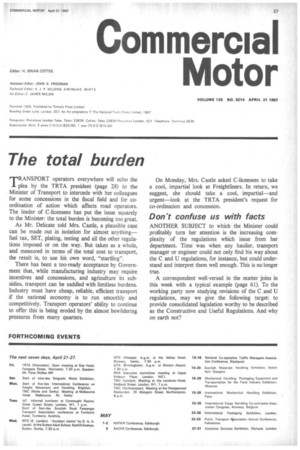The total burden
Page 29

If you've noticed an error in this article please click here to report it so we can fix it.
TRANSPORT operators everywhere will echo the .I. plea by the TRTA president (page 28) to the Minister of Transport to intercede with her colleagues for some concessions in the fiscal field and for coordination of action which affects road operators. The leader of C-licensees has put the issue squarely to the Minister: the total burden is becoming too great.
As Mr. Delicate told Mrs. Castle, a plausible case can be made out in isolation for almost anything— fuel tax, SET, plating, testing and all the other regulations imposed or on the way. But taken as a whole, and measured in terms of the total cost to transport, the result is, to use his own word, "startling".
There has been a too-ready acceptance by Government that, while manufacturing industry may require incentives and concessions, and agriculture its subsidies, transport can be saddled with limitless burdens. Industry must have cheap, reliable, efficient transport if the national economy is to run smoothly and competitively. Transport operators' ability to continue to offer this is being eroded by the almost bewildering pressures from many quarters. On Monday, Mrs. Castle asked C-licensees to take a cool, impartial look at Freightliners. In return, we suggest, she should take a cool, impartial—and urgent—look at the TRTA president's request for co-ordination and concession.
Don't confuse us with facts
ANOTHER SUBJECT to which the Minister could profitably turn her attention is the increasing complexity of the regulations which issue from her department. Time was when any haulier, transport manager or engineer could not only find his way about the C and U regulations, for instance, but could understand and interpret them well enough. This is no longer true.
A correspondent well-versed in the matter joins in this week with a typical example (page 61). To the working party now studying revisions of the C and U regulations, may we give the following target: to provide consolidated legislation worthy to be described as the Constructive and Useful Regulations. And why on earth not?




































































































































